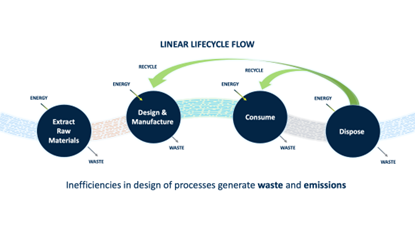We’ve all seen images of plastic trash floating in the oceans and huge landfill locations. A lot of work is going into how to recycle this waste to drive greater sustainability.
In a ControlGlobal.com article, Automation enables a circular economy for plastic recycling, Emerson’s Don Fregelette highlights the role of automation in “creating a sustainable solution for plastic trash by improving manufacturing processes.”
Don opens the article by highlighting the challenge of using plastic trash as a feedstock.
Recycling should be an obvious solution since most people are willing to use the colored or divided bins we see everywhere. However, barely 10% of plastic trash is recycled. It’s constrained by the variety of plastics in use, and because most recycling approaches only work on a few types of plastics. For example, polypropylene doesn’t mix with polyethylene, so most recycling approaches require sorting trash to isolate individual types.

“…each step has its own energy input and its own waste stream, making a linear arrangement ultimately inefficient.”
He shows the problem with the traditional linear approach (shown right).
Waste comes not only from what is disposed of but also from excess water use, underutilized feedstock, and unrecovered energy between steps in the manufacturing process.
In a circular flow:
- Waste is reintegrated into new products;
- Energy is recovered and retained from one step to the next;
- Additional energy comes from renewable sources as needed; and
- Products are designed and manufactured to apply these concepts.
Automation technology plays a significant role in adopting a circular lifecycle flow process.
Fortunately, many digitalization tools are available to make these steps possible and practical. They begin by making changes from the bottom up, beginning with instrumentation and control to providing the data necessary to close the gaps. For example, it isn’t possible to manage and optimize energy use if it isn’t measured with required levels of detail.
Don lists six areas to drive more sustainable operations through digitalization.
Feedstock production—Optimize production of polymer feedstocks, including optimal blending of recyclate to minimize emissions and waste. Improve reliability to avoid unplanned incidents that waste energy and feedstock.
Polymer production—Optimize material and energy balances across unit operations, while improving internal recycling of material and heat to reduce waste.
Advanced recycling—Improve advanced recycling processes to maximize reuse of material, and to capture and track use of post-consumer resin to support certification.
Waste collection—Optimize the supply chain to improve the capture, processing and reintegration of post-consumer waste into production.
Recyclate upgrading—Optimize and assess the quality of post-treated recyclate to improve downstream use in feedstock or polymer production.
Throughout circularity—Mitigate project risk and improve safety management with improved data management and analysis.
Read the article and visit the Chemical Recycling page on Emerson.com for more on how to drive more sustainable plastic manufacturing through waste minimization and increased energy efficiency.




